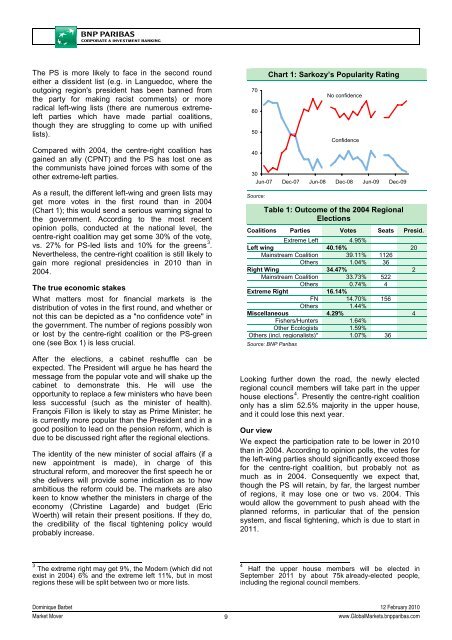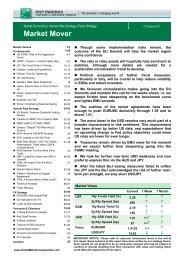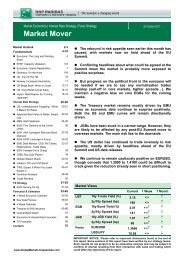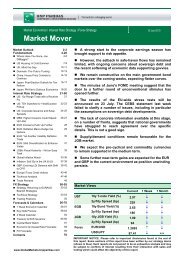Market Mover - BNP PARIBAS - Investment Services India
Market Mover - BNP PARIBAS - Investment Services India
Market Mover - BNP PARIBAS - Investment Services India
You also want an ePaper? Increase the reach of your titles
YUMPU automatically turns print PDFs into web optimized ePapers that Google loves.
The PS is more likely to face in the second round<br />
either a dissident list (e.g. in Languedoc, where the<br />
outgoing region's president has been banned from<br />
the party for making racist comments) or more<br />
radical left-wing lists (there are numerous extremeleft<br />
parties which have made partial coalitions,<br />
though they are struggling to come up with unified<br />
lists).<br />
Compared with 2004, the centre-right coalition has<br />
gained an ally (CPNT) and the PS has lost one as<br />
the communists have joined forces with some of the<br />
other extreme-left parties.<br />
As a result, the different left-wing and green lists may<br />
get more votes in the first round than in 2004<br />
(Chart 1); this would send a serious warning signal to<br />
the government. According to the most recent<br />
opinion polls, conducted at the national level, the<br />
centre-right coalition may get some 30% of the vote,<br />
vs. 27% for PS-led lists and 10% for the greens 3 .<br />
Nevertheless, the centre-right coalition is still likely to<br />
gain more regional presidencies in 2010 than in<br />
2004.<br />
The true economic stakes<br />
What matters most for financial markets is the<br />
distribution of votes in the first round, and whether or<br />
not this can be depicted as a "no confidence vote" in<br />
the government. The number of regions possibly won<br />
or lost by the centre-right coalition or the PS-green<br />
one (see Box 1) is less crucial.<br />
After the elections, a cabinet reshuffle can be<br />
expected. The President will argue he has heard the<br />
message from the popular vote and will shake up the<br />
cabinet to demonstrate this. He will use the<br />
opportunity to replace a few ministers who have been<br />
less successful (such as the minister of health).<br />
François Fillon is likely to stay as Prime Minister; he<br />
is currently more popular than the President and in a<br />
good position to lead on the pension reform, which is<br />
due to be discussed right after the regional elections.<br />
The identity of the new minister of social affairs (if a<br />
new appointment is made), in charge of this<br />
structural reform, and moreover the first speech he or<br />
she delivers will provide some indication as to how<br />
ambitious the reform could be. The markets are also<br />
keen to know whether the ministers in charge of the<br />
economy (Christine Lagarde) and budget (Eric<br />
Woerth) will retain their present positions. If they do,<br />
the credibility of the fiscal tightening policy would<br />
probably increase.<br />
70<br />
60<br />
50<br />
40<br />
Chart 1: Sarkozy’s Popularity Rating<br />
30<br />
Jun-07 Dec-07 Jun-08 Dec-08 Jun-09 Dec-09<br />
Source:<br />
No confidence<br />
Confidence<br />
Table 1: Outcome of the 2004 Regional<br />
Elections<br />
Coalitions Parties Votes Seats Presid.<br />
Extreme Left 4.95%<br />
Left wing 40.16% 20<br />
Mainstream Coalition 39.11% 1126<br />
Others 1.04% 36<br />
Right Wing 34.47% 2<br />
Mainstream Coalition 33.73% 522<br />
Others 0.74% 4<br />
Extreme Right 16.14%<br />
FN 14.70% 156<br />
Others 1.44%<br />
Miscellaneous 4.29% 4<br />
Fishers/Hunters 1.64%<br />
Other Ecologists 1.59%<br />
Others (incl. regionalists)* 1.07% 36<br />
Source: <strong>BNP</strong> Paribas<br />
Looking further down the road, the newly elected<br />
regional council members will take part in the upper<br />
house elections 4 . Presently the centre-right coalition<br />
only has a slim 52.5% majority in the upper house,<br />
and it could lose this next year.<br />
Our view<br />
We expect the participation rate to be lower in 2010<br />
than in 2004. According to opinion polls, the votes for<br />
the left-wing parties should significantly exceed those<br />
for the centre-right coalition, but probably not as<br />
much as in 2004. Consequently we expect that,<br />
though the PS will retain, by far, the largest number<br />
of regions, it may lose one or two vs. 2004. This<br />
would allow the government to push ahead with the<br />
planned reforms, in particular that of the pension<br />
system, and fiscal tightening, which is due to start in<br />
2011.<br />
3 The extreme right may get 9%, the Modem (which did not<br />
exist in 2004) 6% and the extreme left 11%, but in most<br />
regions these will be split between two or more lists.<br />
4 Half the upper house members will be elected in<br />
September 2011 by about 75k already-elected people,<br />
including the regional council members.<br />
Dominique Barbet 12 February 2010<br />
<strong>Market</strong> <strong>Mover</strong><br />
9<br />
www.Global<strong>Market</strong>s.bnpparibas.com
















